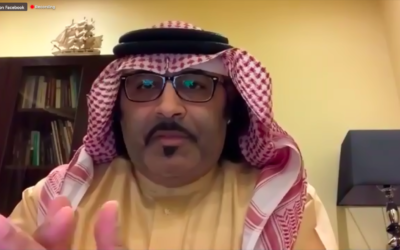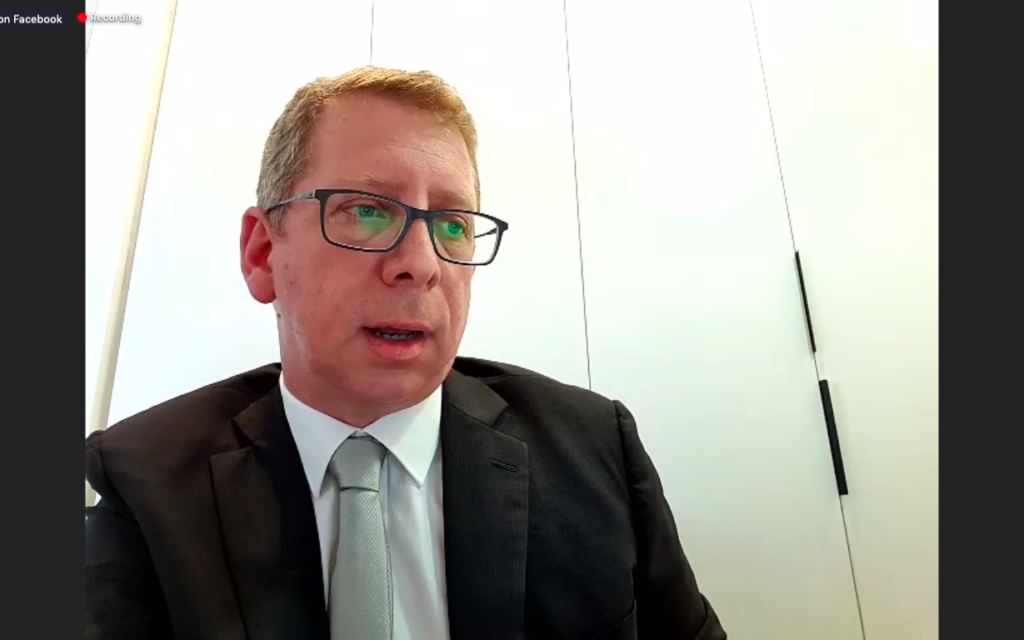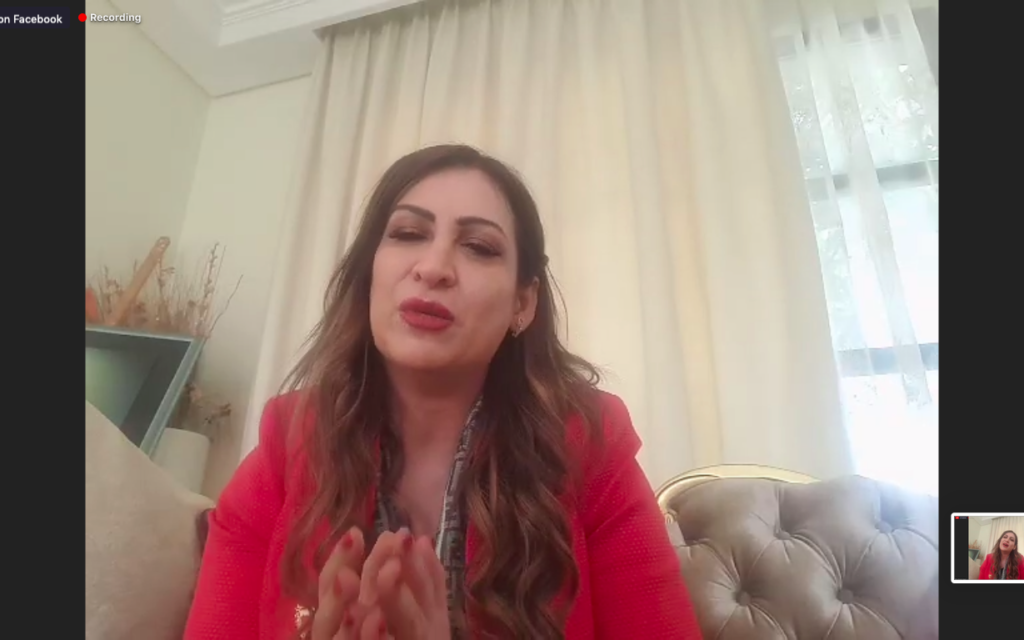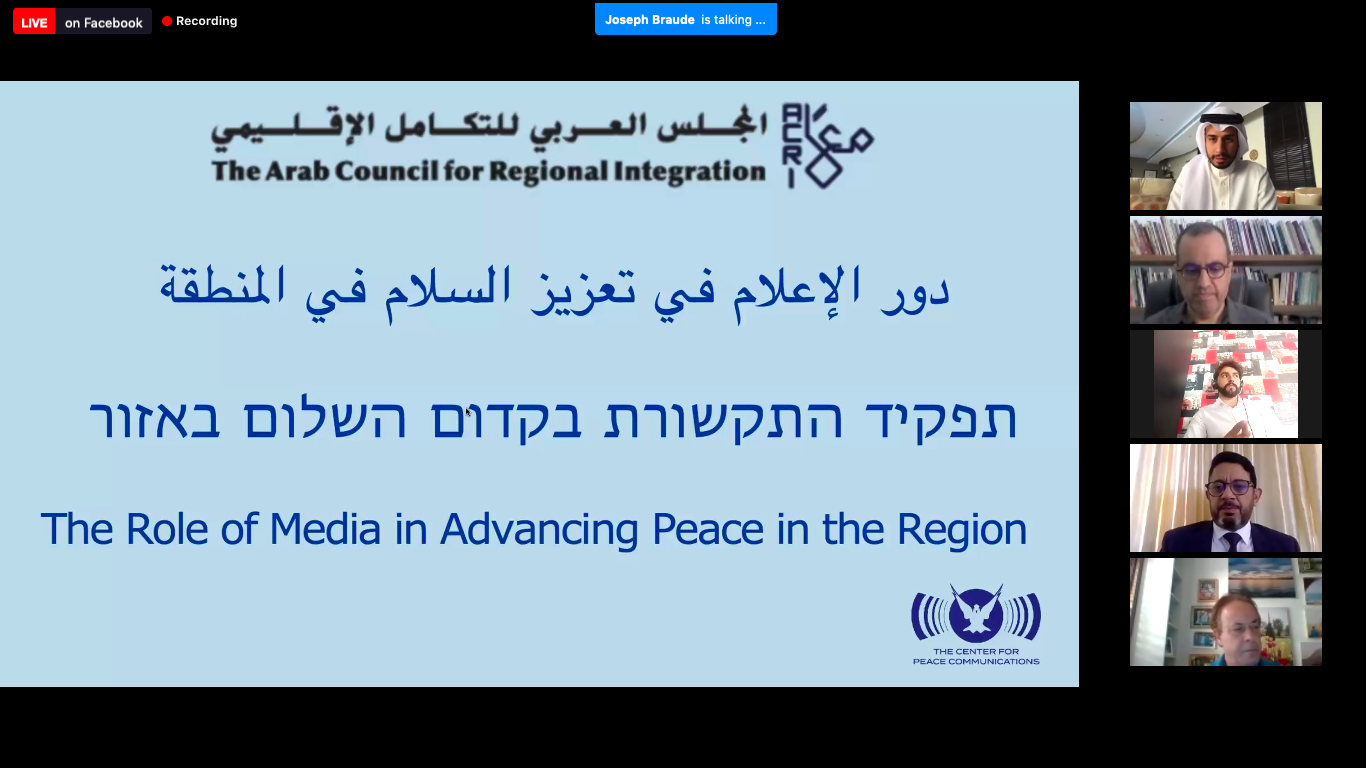
In unique, 2-hour Arab-Israel meet, reporters, officials from across region discuss journalists’ role in warming ties; Rivlin sends letter inviting Arab participants to Israel.
More than a dozen senior communication professionals, journalists and academics from the Arab world, including countries with no formal ties to Israel, on Monday took part in an unprecedented online forum to discuss with Israeli journalists and several senior government officials the role of the media in forging peace in the Middle East.
Participants hailed not only from Israel’s new peace partners — the United Arab Emirates and Bahrain — but also from Saudi Arabia, Sudan and Algeria, where any action seen as “normalizing” ties with the Jewish state is still considered a crime.
“This is a historic conversation,” Israel’s Regional Cooperation Minister Ofir Akunis said early in the webinar. “Just like last week’s signing of the peace agreement with the UAE and Bahrain was historic, this meeting is historic. It’s joyous, momentous occasion.”
Akunis urged the organizers of the webinar, a group called Arab Council for Regional Integration, to organize a delegation of media professionals from across the region to Israel. “There is no way around it, this is the best way to cover the State of Israel from up close — its beauty, its hospitality, and of course all the opportunities for bilateral cooperation that exist.”

which senior Israeli officials and communications professionals discussed
ways to advance Arab-Israel peace with media professionals from several
Arab countries, September 21, 2020 (Courtesy)
The Arab Council for Regional Integration is a pan-Arab initiative dedicated to fighting the taboo against interactions with Israel that exists across the region. Its general coordinator is author and activist Joseph Braude, who moderated the event.
President Reuven Rivlin did not directly participate in the event, but Ofir Gendelman, Prime Minister Benjamin Netanyahu’s spokesperson to the Arabic media, read out a statement from Rivlin on his behalf, in Hebrew and Arabic.

Rivlin said it was a “great honor” for him to address journalists from across the region that have gathered online for an “important conversation” about peace. He mentioned that his father, Professor Yosef Yoel Rivlin, was a scholar of Arabic language and culture and had translated the Quran into Hebrew.
“I remember my childhood home as a place where Jewish, Muslim and Christian scholars would meet, the bookshelves full of the key texts of Judaism and Islam, in Hebrew and in Arabic,” Rivlin recalled. “My father was an admirer of the Semitic spirit and believed wholeheartedly in the promising future of the Middle East, based on partnership and the deep connection between the peoples of the region and their cultures.”
He sees this very spirit of coexistence in the peace agreements Israel signed last week with the UAE and Bahrain, he said. “I also see this spirit and belief in your work together to foster a public discourse of engagement, understanding and friendship among the peoples of the region,” he told the participants.
“The role of the media is to convey this with clarity and precision to your audiences,” he went on. “I am sure your readers and viewers are intensely curious and urgently want to know Israeli society better. I encourage you to dream big dreams — of exchange programs, joint productions and education programs for young journalists, and I hope you send correspondents here to cover the State of Israel and its society, as I hope our media will send to your countries.”
The president ended his greeting with an invitation to “every one of you” to come to Israel “to get to know us better.
Communications Minister Yoaz Hendel also briefly addressed the 130-minute webinar, highlighting the crucial role of the press as a watchdog of politicians and warning against the harmful potential of social media.
“We live in an era where the speed of communications gets quicker and quicker, with fiber optics and 5G. Therefore, it’s important for you journalists to try to give more depth to the words you publish,” he said
The first Arab media professional to speak to the event was Mohamed Al Hammadi, the editor of Alroeya, an Arabic-language daily based in the UAE, and the former editor of the country’s Al-Ittihad newspaper
“It’s hard to imagine such a meeting just a few years ago,” he said, before addressing the challenges of journalists from Israel and Arab states. “We Arabs don’t know Israelis well enough — not as well as we should; maybe the Israelis don’t know us as well as they should, either,” he said.
‘We Arabs don’t know Israelis well enough — not as well as we should — maybe the Israelis don’t know us as well as they should, either’
He acknowledged that many Arabs believe in negative stereotypes about Jews and lamented that he and his colleagues who write positively about normalization with Israel are subjected to much abuse. “This is why meetings like these are of particular importance. Collaboration between us is the only way we can overcome the streams of enmity.”
At the same time, Al Hammadi stressed that the Arab streets still deeply cares about the Palestinian people and that their right to an independent state should not be sidelined in the coverage about Israel’s rapprochement with Arab states.
Many speakers urged the fresh peace agreements to be translated into joint projects and enduring partnerships.

Ahdeya Ahmed Al-Sayed, the president of Bahrain’s journalists association, said she was happy to report that there have been numerous op-eds in the local press welcoming Manama’s intention to normalize relations with Israel. However, she stressed that there are also prominent voices who not only oppose peace with Israel but also attack journalists who are supportive of it.
“The incitement against us is not less harmful than the wars [between Arab states and Israel] themselves,” she said.
The webinar was held in a mixture of Hebrew, Arabic and English, with Braude, the host, translating.
Mohamed Mubarak, from Bahrain, said he understood about a third of what the Hebrew speakers were saying, noting, “We and our Jewish and Israeli neighbors have more in common than separates us.”
Dr. Najat Al Saied, a Saudi expert on communication and media sciences, said that the role of the journalists in fostering an atmosphere of peace is greater than ever. However, she said that in addition to the traditional press and social media, people should also use drama, comedy and documentaries — “things that the touch the heart” — to influence their respective populations. “That’s possibly even more important than covering the news,” she said.
Al-Nur Abdallah Jadein, the discussion’s only participant from Sudan, stressed the media’s role in “preparing society for peace.” He was cut short due to problems with his internet connection. Like Sami Baziz, a journalist and activist from Algeria who also spoke, he risked criminal prosecution because interacting with Israelis is still banned in his country.

Mostafa El-Desoukki, an Egyptian-born journalist at Saudi magazine Majalla, hailed his colleagues in Algeria and Sudan for their courage to “challenging the laws of their countries, where normalization with Israel is considered a crime.” They are willingly violating the rules “to show to the entire world that the Arab world is not only made up of violent people, but there are are also Sudanese and Algerians youths who want to have peace.”
‘The more we actually understand honestly each other’s countries, and the controversies and the complications, the more this new era of cooperation and reconciliation will be stable and sustainable’
Times of Israel editor David Horovitz, one of several Israeli participants, stressed that this online meeting should not be taken for granted, and noted that he had never spoken to people from more than one of the countries represented in this call.
He noted that The Times of Israel, which he founded in 2012, has editions in several languages including Arabic and Persian, precisely “because we want people to be able to understand what’s happening here and have access to an honest narrative,” he said.
“The job of journalists is to communicate and also to strive for truth. And I think that the more we actually understand honestly each other’s countries, and the controversies and the complications, the more this new era of cooperation and reconciliation will be stable and sustainable.”
Horovitz called on Israeli and Arab journalists to “travel, as much as we can, in each other’s direction,” saying that journalists “should be on the cutting edge of informing. We should learn ourselves and we should inform our readers and our viewers.”
(Times of Israel).